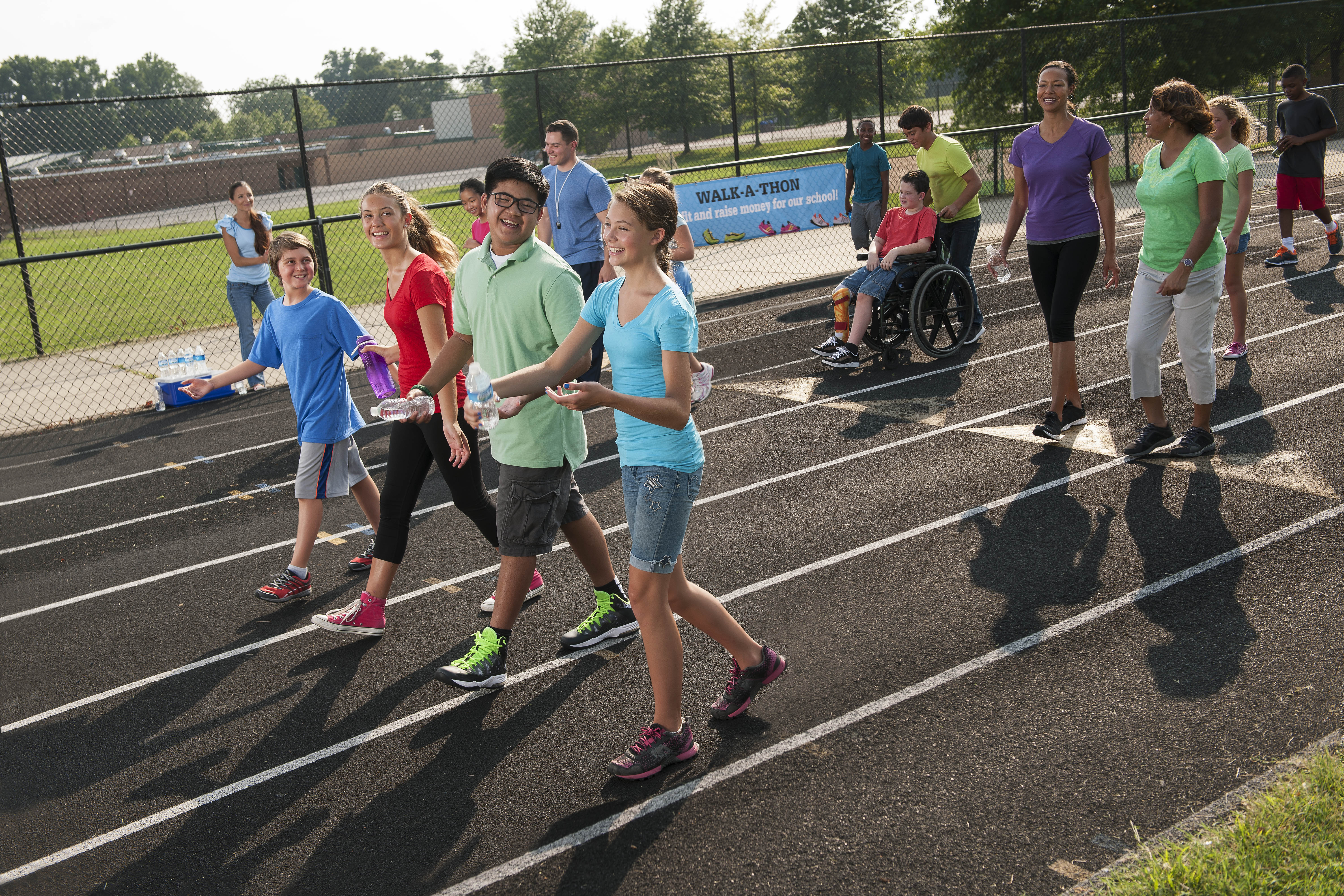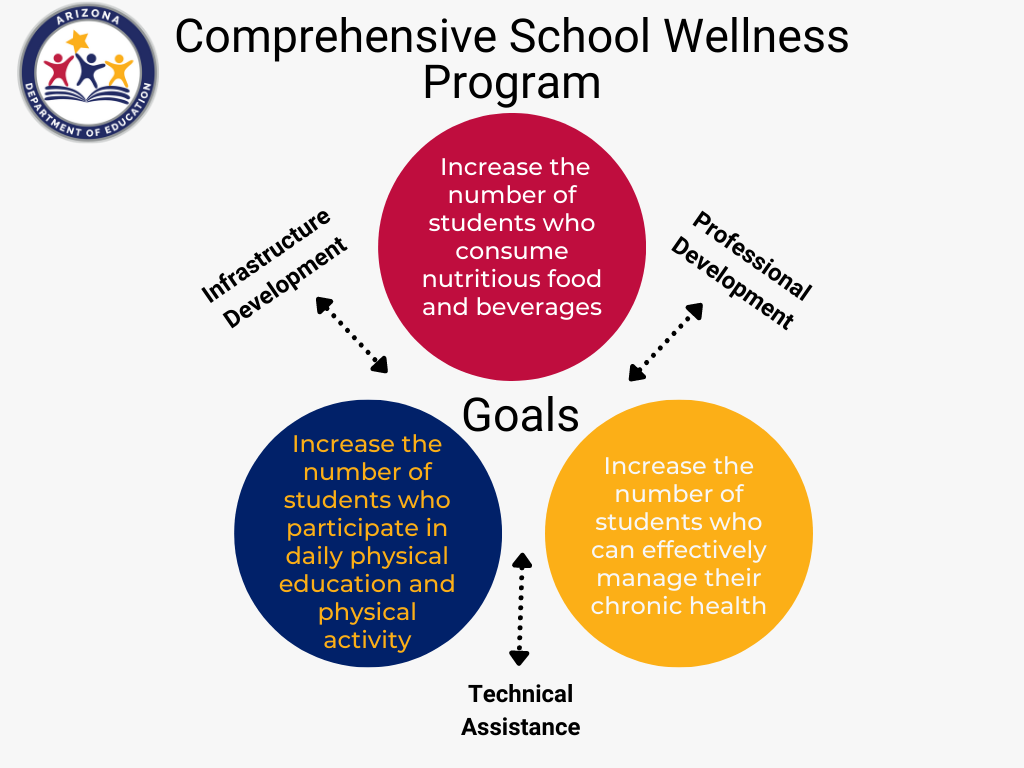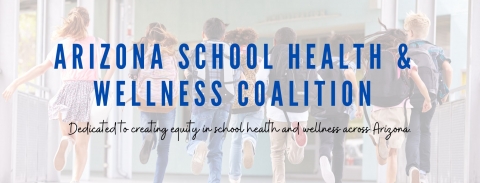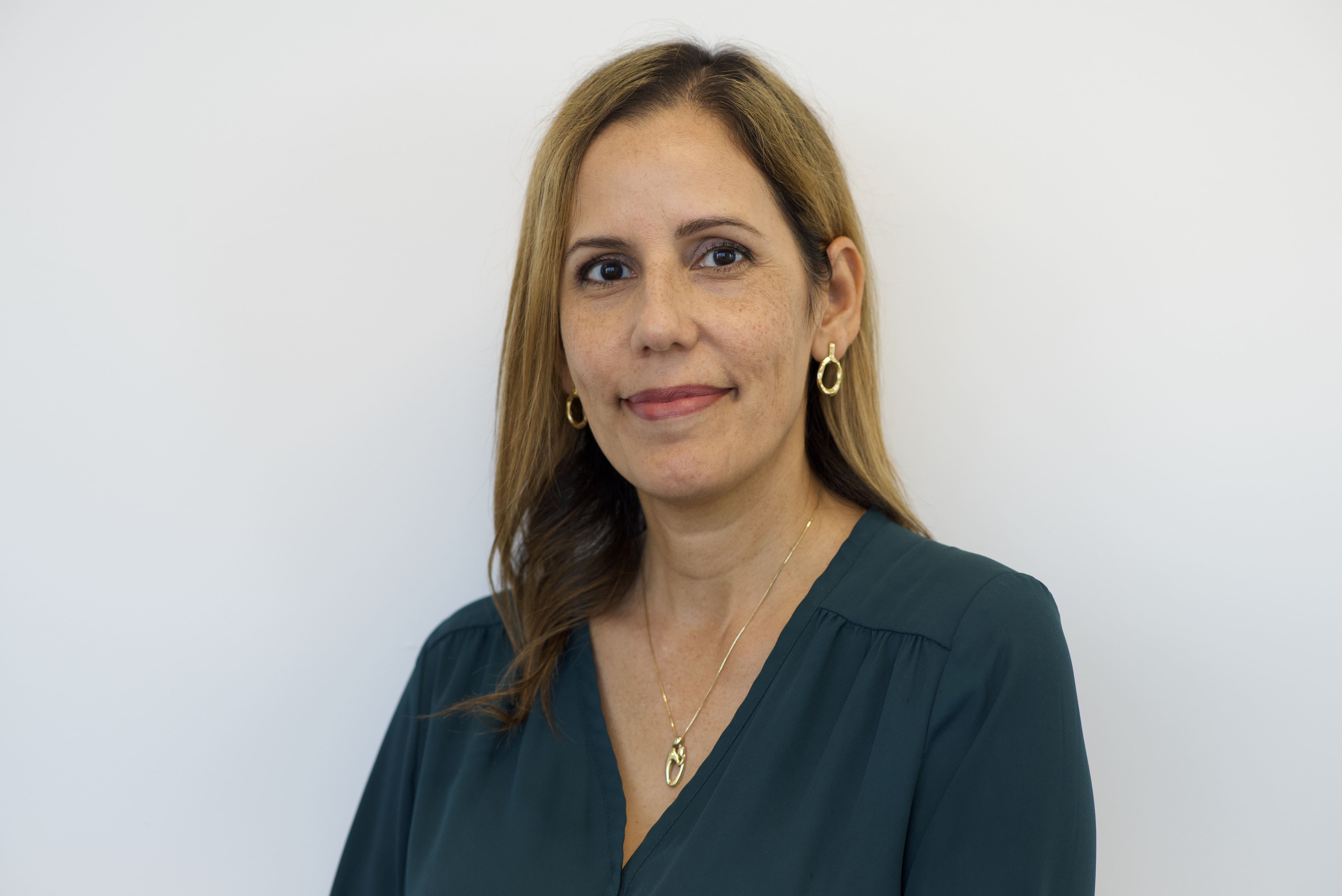Comprehensive School Wellness Program
Healthy students are better learners. Schools play a critical role in promoting the health and safety of young people and helping them establish lifelong healthy behaviors. Establishing healthy behaviors during childhood is easier and more effective than trying to change unhealthy behaviors throughout adulthood. When school health policies and practices are put in place, healthy students can grow to achieve a lifetime of good health.
The Comprehensive School Wellness (CSW) Program at the Arizona Department of Education (ADE) is a team of school health specialists dedicated to supporting schools across the state in creating healthy learning environments.
Five Steps to Navigating the CSW Program Website
Follow these 5 steps to get started with the CSW Program. By staying connected, we can ensure students, staff, and schools are equipped with the necessary tools to improve health and academic achievement!
- We realize that every school has a unique set of needs, which is why we are here to help school leaders and staff create supportive school environments. If you have a question, complete the online Technical Assistance Request form and our team will contact you!
- Make sure you sign up to receive communication from the CSW program, so you can be equipped with the information, resources, and professional development opportunities to support student health and academic achievement through nutrition, physical activity, and the management of chronic conditions.
- The Comprehensive School Wellness Program wants to highlight the great work that is going on in all Arizona schools. Fill out the School Spotlight form to highlight a school’s health initiatives and be featured in Healthy Happenings.
- Become an advocate for School Health in your community! Sign up for the Arizona School Health and Wellness Coalition to help make an impact in Arizona’s school health environment.
- Bookmark this website to stay up to date on upcoming events and helpful resources!
1801 Grant: Improving Student Health and Academic Achievement through Nutrition, Physical Activity, and the Management of Chronic Conditions in Schools
The CSW Program is funded by the 1801 “Improving Student Health and Academic Achievement through Nutrition, Physical Activity and the Management of Chronic Conditions in Schools" grant offered through the Centers for Disease Control and Prevention's (CDC) Healthy Schools Branch. CDC provides technical assistance, tools, recommendations, and resources to assist with school health initiatives within the grant. Under the 1801 grant, ADE directly supports five Local Education Agencies (LEAs). These are Destiny School, Mingus Union High School District, Mohave Valley Elementary School District,Tombstone Unified School District, and Vernon Elementary School District.
ADE works along three strategies to provide 1801 grant activities: infrastructure development, professional development, and technical assistance.
Infrastructure Development works to create a health-aware infrastructure among all regions of Arizona to support, assess, and develop health-promoting best practices and strategies that improve physical activity, nutrition, and the management of chronic conditions in schools. This directly enhances a student's social, emotional, and physical well-being. To do this, the CSW Program encourages schools to utilize the School Health Index, to assess and create supportive school environments. In addition, Local School Wellness Policy guides local education agencies and school districts to create supportive school nutrition and physical activity environments.
Professional Development activities promote school health by offering continuing education on important health topics. ADE delivers and partners with state agencies and local organizations to implement strategies that promote a healthy learning environment. In addition, ADE spreads awareness of the opportunities available to out-of-school health staff and officials. Through professional development activities, ADE utilizes the WSCC model to develop training that utilizes school health tools and resources, while highlighting the connections between school health and academic achievement.
Technical Assistance is provided to all schools, districts, and LEAs across the state, free of charge. Our team works with school leaders to support and provide guidance on the health and wellness needs of their staff, students, and community through the development of CSW activities.
Complete the online Technical Assistance Request form and our team will contact you!
To effectively work throughout the state, ADE works alongside internal state partners and external community partners to provide support.
- ADE’s Title IVA Safe and Healthy Students Program aims to provide support to schools and local education agencies (LEAs) so that every student can experience a safe, healthy, and supportive learning environment through a focus on physical and mental health, and safety.
- The 1801 grant works in conjunction with Arizona school nurses and health staff in efforts to manage the prevalence of chronic disease in schools. Please visit the School Nursing and Health Staff webpage for more information on supporting health office staff and students managing their own chronic conditions.
- ADE holds a collaborative partnership with the Arizona Department of Health Services (ADHS) which provides nutrition and physical activity support through AZ Health Zone. AZ Health Zone focuses on supporting communities across Arizona to make healthy changes in homes and neighborhoods, both within the school and the home.
CDC Healthy Schools works with states, school systems, communities, and national partners to prevent chronic disease and promote the health and well-being of children and adolescents in schools. CDC Healthy Schools supports state education agencies (SEAs) in the implementation and evaluation of evidence-based strategies to prevent and manage chronic health conditions prevalent in student populations.
The CDC Healthy Schools website provides many resources that can be of use to schools across Arizona.
Local Wellness Policy: Local School Wellness Policy | Healthy Schools | CDC
School Health Guidelines: School Health Guidelines | Healthy Schools | CDC
School Health Index: School Health Index: A Self-Assessment and Planning Guide (cdc.gov)
School Nutrition: School Nutrition Environment | Healthy Schools | CDC
Video Training: Comprehensive School Physical Activity Programs: A Guide for Schools (cdc.gov)
Recess Planning in Schools: Recess Planning in Schools: A Guide to Putting Strategies for Recess into Practice (cdc.gov)
Out of School Time: Out of School Time (cdc.gov)
Chronic Health Conditions: Chronic Health Conditions in School Settings (cdc.gov)
School Health Services: School Health Services | Healthy Schools | CDC
Parents for Healthy Schools: Parents for Healthy Schools | Healthy Schools | CDC
CDC’s Virtual Healthy School (VHS) is an interactive tool that shows schools how to support the health and academic achievement of students through a coordinated effort.
The CDC Virtual School can provide examples within the school environment that allow for students to improve their dietary and physical activity behaviors and manage their chronic health conditions. Click the link below to navigate through a virtual healthy school!
The Arizona School Health and Wellness Coalition (ASHWC) is a collaboration of key school health stakeholders, state and local organizations, community members, parents and individuals whose primary goal is to assist schools in creating healthy school environments and communities. ASHWC serves as an organized platform that provides a voice to those who are passionate about school health. It promotes the multi-disciplinary approach to school health.
Contact:
Email: [email protected]
Website: https://www.azschoolhealth.com/
The Comprehensive School Wellness (CSW) Program wants to highlight the amazing work that happens each day around our schools in Arizona. Positive school health environments include those coordinating policy, process and programs to ensure students are safe, healthy, engaged, supported, and challenged. We encourage you to nominate Arizona schools through the School Spotlight Nomination, As we continue through the year, the CSW Program is excited to share all of the dedication that goes into the work of our schools each day.
See what schools across Arizona are doing and gain inspiration for your own school health initiatives through a School Spotlight!
Additional School Resources
The Comprehensive School Wellness Program is here to support your school. Through incorporating evidence-based health practices, we can ensure sustainability for healthy initiatives. There are many resources available to help guide the effective incorporation of health initiatives in schools.
Upcoming Professional Development Opportunities
We strive to provide ample opportunities to build knowledge that supports student health and academic acheievement. We encourage participants to attend events for the opportunity to engage, connect, and receive credible resources from around the nation. Please view the upcoming trainings, webinars, conferences and/or other professional development events offered.
In celebration of National Physical Education and Sports Week, the Comprehensive School Health and Wellness Program at the Arizona Department of Education will be hosting a free in-person training with the Online Physical Education Network, OPEN! This training will provide individuals with teaching and learning resources aligned to the Arizona Standards for K-12 for Physical Education.
Details of the training:
When: May 4th, 2023|Secondary : 8 am – 11 am, Register here. | Elementary: 12 pm – 3 pm, Register here.
Where: The Salvation Army Kroc Center | 1375 E. Broadway Road, Phoenix, Arizona 85040
What: This is an activity-based session - come prepared and ready to move! Every OPEN instructional module includes research-based teaching tools such as academic language resources, Marzano academic rigor strategies, and universal design strategies. Activities and associated resources will be aligned to the Arizona Standards for K-12 Physical Education and SHAPE America standards at the elementary, middle, and high school levels.
Attendees will receive: Each attendee will receive an equipment piece modeled in the OPEN training.
Target Audience: Elementary and Secondary Physical Educators across Arizona.
Comprehensive School Wellness On-Demand Opportunities
We strive to provide ample opportunities to build knowledge that supports student health and academic achievement. On-demand learning can allow for easy access to great resources and information at your convenience. Each time the CSW program hosts a webinar, the recording and slides will be placed here. Please see below past profressional development webinars.
The ADE Comprehensive School Wellness Program hosted free virtual discussion on Youth Substance Use In Arizona on October 24, 2022 from 3:00-4:30 PM MST.
Topic: Youth Substance Use in Arizona: Current Trends and Prevention Practices to Mitigate Risk
Objectives of the Webinar:
- Learn more about substance use trends among Arizona youth.
- Explain common risk factors for substance use and know what to look for when someone needs help.
- Gain resources to help keep youth safe and/or obtain treatment when they need it.
- Gain resources on prevention practices that effectively mitigate risks associated with youth substance use.
Target Audience: K-12 school nurses and mental health professionals. Anyone interested in learning more about youth substance use is welcome!
Please see below for the webinar recording and slides.
Webinar Recording Passcode: GN#%?5qp
Welcome to the Comprehensive School Wellness Program's three-part information series on school health resources that support improving and enhancing your school health environment. During each of these videos, you will have the opportunity to learn about forming a school health advisory council (SHAC), completing the school health index (SHI), and planning for improvement.
Building and Maintaining A School Health Advisory Council (SHAC)
In this video, we will discuss the involvement of the school health advisory council, or SHAC, and how they can best be sustained to further school health initiatives and enhance the school health environment.
Completing the School Health Index (SHI)
In this video, we will discuss completing the school health index, or SHI, and how the SHI can be used to facilitate a team-driven approach to assessing and improving school health policies and practices.
Planning for Improvement
In this video, you will learn about an improvement plan and how it allows your school to review recommendations, monitor progress, and identify low-cost to no-cost changes that enhance the school's health environment.
Throughout the year, the Comprehensive School Wellness Program, in collaboration with AZ Health Zone, hosted a four-part webinar series on Trauma-Informed Approaches to Physical Activity and Nutrition. Please see below to access each recorded session.
Session 2: Trauma Informed Approaches to Nutrition and Health Promotion and Engagement
Passcode: c=9bGm-#
Session 3: The Language of Health: Trauma Informed Approaches to Messaging Part 1
Passcode: T%pFvD2%
Session 4: The Language of Health: Trauma Informed Approaches to Messaging Part 2
Passcode: LH!4kBf+
On December 7th, from 4:00 PM to 5:00 PM, the Arizona Department of Education invited teachers, health educators, and school administrators to a free discussion on the Comprehensive School Physical Activity Program (CSPAP). During this, we talked about CSPAP, which is a multi-component approach by which school districts and schools use all opportunities for students to be physically active, meet the nationally-recommended 60 minutes of physical activity each day, and develop the knowledge, skills, and confidence to be physically active for a lifetime. A CSPAP reflects strong coordination and synergy across all of the components: physical education as the foundation; physical activity before, during, and after school; staff involvement; and family and community engagement. This session will provide an overview of the CSPAP, including implementation strategies that include social-emotional learning and possible funding sources.
Please see below to access the recording.
Comprehensive School Physical Activity Programs Webinar Recording
Passcode: K^zJWB5j
Comprehensive School Physical Activity Programs Webinar Slides
On March 9th, 2023 from 3:30 to 4:45 PM, the Arizona Department of Education hosted a free discussion, A Holistic Approach to Family-School Partnerships, led by the Arizona State University REACH Institute. Research overwhelmingly demonstrates that involving families in educational partnerships is essential to student success. Approaching this work through a holistic lens is critical for creating and sustaining positive relationships between schools and families. This session focused on the benefits of these partnerships, the challenges of engaging families, and strategies to facilitate family engagement. A holistic approach encompassing a culturally responsive and trauma-informed framework was highlighted.
Objectives: Gain an understanding of the critical value of creating and maintaining positive family-school partnerships to promote student success; Articulate an understanding and engage in practices to work with students and families from a sociocultural perspective; Increase their knowledge of tangible strategies with which to engage families and students; Recognize contextual factors that impact family-school partnerships.
Passcode: ^=0H0adj
Continue to Stay up To Date on All Comprehensive School Wellness Professional Development Events!
Through the CSW calendar, you have the ability to save these events to your personal calendar. We encourage you to check regularly as Professional Development events are added on a recurring basis.
The Comprehensive School Wellness team is composed of many Arizona school health champions. Through the inclusion of the 1801 grant, this team is lucky to partner with talented individuals that represent different perspectives of school health. This includes a AZ Health Zone School System Specialist from the Arizona Department of Health Services, an evaluation team from Arizona State University and a School Nurse Health Consultant; in addition to the Comprehensive School Wellness team.
Michelle Cabanillas: Michelle serves as the Co-Director for the School Safety and Social Wellness Programs at ADE. Michelle directly supervises the 1801 grant and the Comprehensive School Wellness Program, as well as other wellness programs to include Project AWARE and the School Safety Program. She is a graduate of the School of Social Work at Arizona State University, where she earned a Master of Social Work with a concentration in Planning, Administration, and Community Practice.
Samantha Reeves: Samantha serves as the School Health and Wellness Specialist, focusing on the Comprehensive School Wellness Program and supporting School Nursing and Health Services. Through this, Samantha supports the 1801 grant and improves physical activity, nutrition, and the management of chronic conditions across Arizona schools. She is a native of Arizona, in where she received her Bachelors of Public Health and Master of Public Health from the University of Arizona, Beardown!
Contact Us
Want to bring the CSW Program to your school? Click below to email us your questions!












